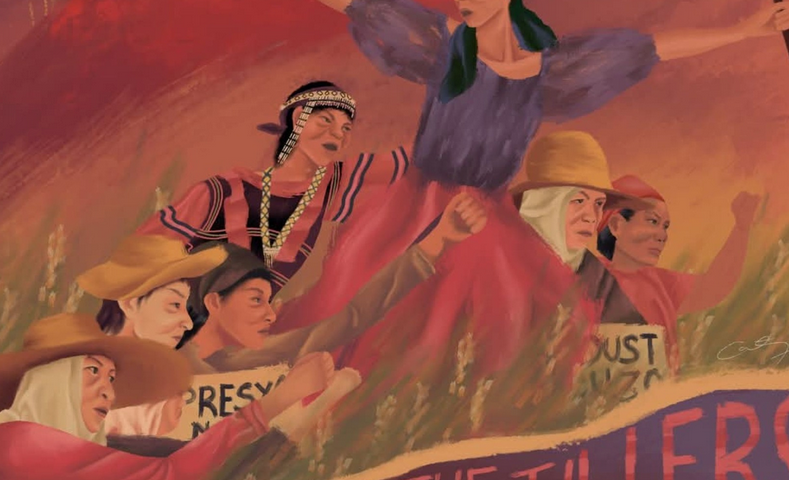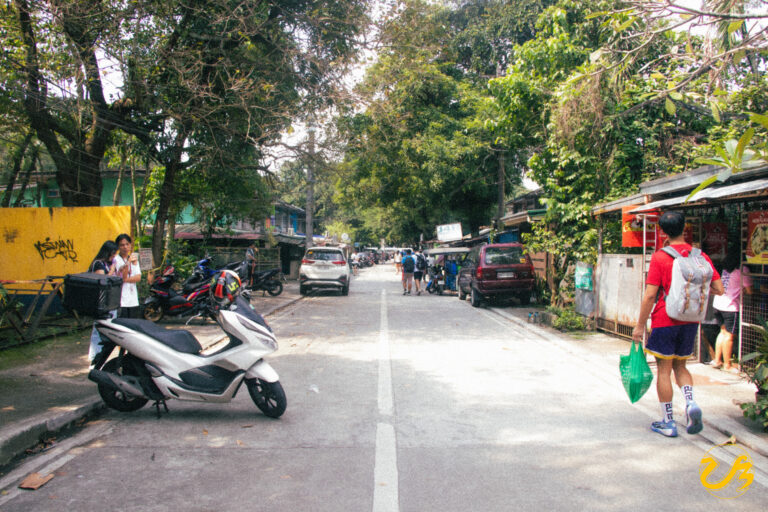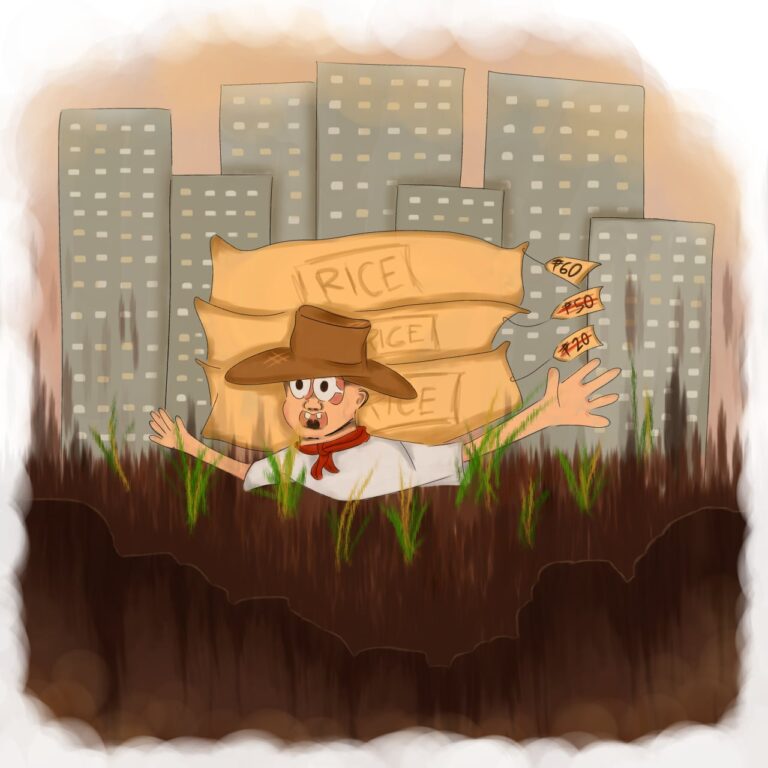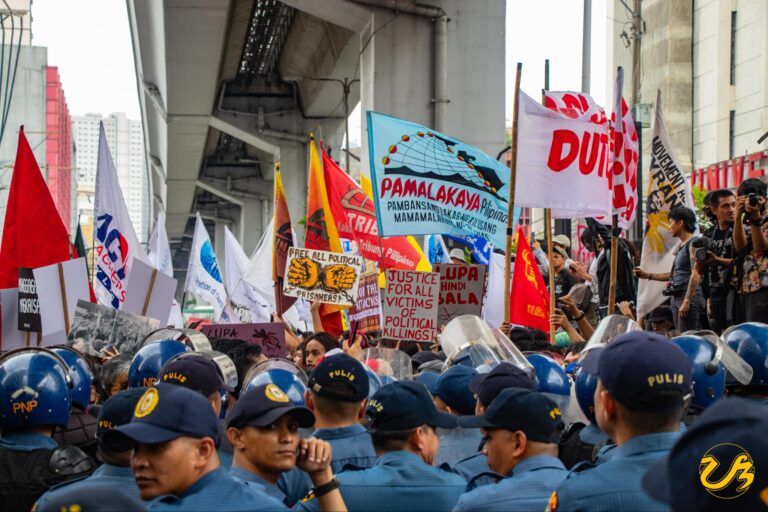by Jay Cruz
Artwork by Kate Gotis
Originally published on October 20, 2022
“Order bag-o ni mayor. Di lang daw mo patyon. Pusilon lang mo sa bisong arong—’ Og wa na ma’y bisong, wa na ma’y silbi.”
(There’s a new order from Mayor [Duterte]. You will not be killed. Your vagina will just be shot since if there is no vagina, it will be useless.)
Patriarchal, “all-men” society – this is the status quo.
As history progressed, women have been reduced only as a supporting actor to men. A society where private property meant power saw the rise of men in every aspect – social, economic, and cultural – while women were defined merely by their virginity and motherhood.
Duterte exploited this system as he is very comfortable working within it.
He knew exactly what to do to stay relevant to the amusement or disgust of the masses that receive his message. Left and right, he would brandish his speeches with rape jokes and tirades against women. He would ramble sexist and uncalled-for remarks — strongly normalizing the archaic notion that society is solely built by and only for men.
His blind supporters and colleagues would constantly tweak the anti-women narratives as justified by Duterte’s alleged “pro-women” policies. They would defend him, paint him, illustrate him not as a sexist, and a backward thinker but a leader respectful of his constituents.
However, truth be told that Duterte’s actions and policies show that he is guilty of the crimes he has perpetually committed against women.
Patriarchy and Tyranny
The economic policies of Duterte, grounded on debunked free-market economics and import-dependence, are deeply intertwined with the reinforcement of the principle he has perpetuated with his mouth – patriarchy.
For the sake of foreign-funded infrastructure, militarization has been his go-to mechanism to guide development aggression into the lands of peasants. Red-tagging, vilification campaigns, and killings terrorize the masses who continually fight for their rights and lands.
Militarization is a danger that undermines the freedom of all peasants. However, rural women are the ones left most vulnerable to harassment by the military that comes with it.
Katrina*, a female peasant teenager, lives in San Miguel, Surigao del Sur. San Miguel is a site of intensified military operations brought by the government’s intent to pave the entry of mining corporations into the peasants’ lands. Last July 17, 2020, her close relative boldly narrated in a radio station the harassment she faced at the hands of military personnel.
She along with another woman were subjected to lascivious remarks from military men. They were asked questions such as “Nakatikim na ba kayo?” (Have you tried having sex?) and “Baka laspag na yan o masikip pa ba?” (Maybe your vagina is loose or is it still tight?).
Katrina’s ordeal is one of the many incidents of rural women being harassed.
For some Indigenous Peoples (IP) communities however, women are relatively not belittled as compared to how they are regarded in the cities.
According to Kakay Tolentino, a Dumagat spokesperson of BAI Indigenous Network, an organization advocating for IP women’s rights, women’s role in defending their ancestral lands has always been given prime importance in their communities.
“Mas malaki ang papel ng kababaihan. Kaming mga katutubo ang may pagsasapraktika ng pantay na karapatan. Hindi katulad dito sa syudad na ayan minamaliit ang mga trabaho,” exclaims Tolentino.
(The role of women is greater. We, Indigenous Peoples, practice the equality of each sex to their rights. Unlike here in the cities, the work of women are belittled.)
According to Tolentino, there are still inevitable traces of male domination in their communities. However, it is the incursions of external forces, whose culture has revolved around the image of man as “macho,” which have reinforced the notion that a woman may just be harassed, objectified, and verbally abused.
Needless to say, these are military men who destroy their lands and culture.
Economic Inequality
In the economic realm, women are forced and damned to muster the brunt of the rotten system.
Rural women have always been placed at a disadvantageous position to fight the origin of their slavery to the feudal landlords – the unequal and exploitative economic structure – and the consequences of it.
Feudalism – the concentration of vast lands at the hands of the powerful few while also tying the peasants to unjust work relations – is a recurring problem in the overexploited countryside wherein peasants, especially rural women, are left jobless and starving.
No lands, low wages, small subsidies – coupled with the Rice Liberalization Law – have dealt a major blow to farmers, especially the women. If peasants have always been placed at the losing end of society, what more for women who have endlessly strived to achieve an equal playing field for both sexes.
Truly, a disparity in wages between male and female peasants is a glaring example. Data from a 2017 to 2019 study of the Philippine Statistics Authority (PSA) has shown that the average daily nominal wage rate of female and male agricultural workers were P304.60 and P335 respectively.
This shows a harsh difference of P30. Albeit small, this lets a glimpse of the gendered division of labor that the ruling class sets. A female, being suppressed, is left with no choice but to work.
In addition, rural women carry more unpaid work as dictated by centuries-long patriarchal ideas. Gender roles continue to limit reproductive and domestic care work to the responsibilities only of a woman. While they are damned to work twice as much, it is the recognition and acknowledgment of their labour, especially in official data, that they also strive to achieve.
“Halos hindi narereflect sa mga data, kokonti lang ang mga peasant women. Hindi siya binibilang na magsasakang bukid. Hindi kinikilala ang trabaho ng mga magsasakang kababaihan. Yung gawain sa bukid at gawain sa bahay ay babae pa rin ang mga gumagampan,” lamented Zenaida Soriano, Amihan – National Federation of Peasant Women Chairperson.
(“[Figures on] peasant women barely surface in data, only a small number are peasant women. They are not recognized as farmers. Their work is also not acknowledged. The work in the farms and the work inside the homes continue to be carried out by women.)
Destroy the System
The state has always hated women aside from those who hail from the ruling class and their armed forces. With the current system, to be a woman is to live a life with odds stacked up against you.
However, to be a woman also means to persistently fight – to constantly question the status quo, to fight against it, and to finally dismantle the oppressive structures.
Patriarchy is as weak as it gets as women organized themselves for gender and national liberation. The peasant women’s fight against the economic system has never withered.
After all, the emancipation of all oppressed peoples from the chains of imperialist plunder and feudalism entails the liberation of all men and women who tirelessly advocate for national liberation and democracy.
Once dismantled, feudal relations will be destroyed and true lasting freedom and equality will ensue.
After the endless struggle, this remains true: Kababaihan, ang lugar mo ay sa pakikibaka!






